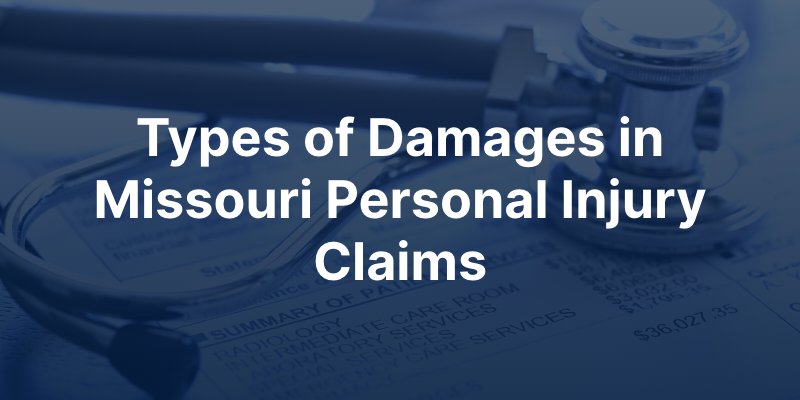What Types of Damages Can Be Recovered in Missouri Personal Injury Claims?
Request Free ConsultationInjuries are unexpected and painful, but they’re often more distressing when they occur directly due to someone else’s negligence, recklessness, or wrongdoing. Injuries have consequences for the victim, including hospital bills and lost income during recovery—and that’s in addition to the pain and suffering. These consequences are known as “damages” in a personal injury claim. Missouri tort law allows victims of injuries caused by someone else to recover compensation for those damages.

Types of Damages in Missouri Personal Injury Claims
A serious injury has ripple effects throughout all aspects of the victim’s life. Tort law divides personal injury claims for compensation into two categories, economic and non-economic damages.
Economic Damages in Personal Injury Claims
Economic damages are easy to calculate by adding up the victim’s injury-related expenses using evidence like receipts, invoices, and employment records. Common economic damages in Missouri personal injury claims include:
- Medical expenses
- Out-of-pocket costs related to the injury
- Anticipated future medical expenses for further care
- Lost wages
- Future income loss for recovery time
- Lowered future earning capacity due to permanent partial or total disability
- Wrongful death
These damages are also known as tangible damages because they come with receipts and numbers.
Non-Economic Damages in Personal Injury Claims in Missouri
Non-economic damages are intangible damages that aren’t as easily quantifiable but are the most damaging aspect of a serious injury. Depending on the type and severity of the injury, these may include some or all of the following:
- Pain and suffering
- Emotional damages like PTSD, anxiety, depression, or sleep disturbances
- Loss of enjoyment of life
- Loss of consortium (the ability to enjoy a full relationship with a loved one)
- Disfigurement compensation
- Loss of limb
- Grief and anguish in wrongful death claims
Most St. Louis injury attorneys and insurance companies use one of two formulas to assign a monetary amount to intangible damages, including pain and suffering. The per diem method uses the victim’s pain scale level to assign an amount of compensation per day multiplied by the number of days a medical expert expects them to feel pain until they reach maximum medical improvement. The multiplier method uses the total cost of medical expenses multiplied by a number between one and five based on the victim’s pain level.
There are additional economic and non-economic damages available in Missouri wrongful death claims.
Punitive Damages
Missouri allows injury victims to claim punitive damages only in cases of egregious wrongdoing, or when a defendant intentionally injures a plaintiff. Punitive damages in Missouri serve as a punishment and deterrent to the wrongdoer rather than compensation for a victim’s losses, but the amount awarded goes to the victim. The injury victim must have ample evidence that the defendant acted intentionally. Missouri §510.261. states the following:
“…Punitive damages shall not be awarded unless the claimant proves by clear and convincing evidence that the defendant intentionally harmed the plaintiff without just cause or acted with a deliberate and flagrant disregard for the safety of others.”

Does Missouri Place Caps on Damages in Personal Injury Claims?
Most states do not place caps on economic damages, but several states cap—or limit—the amount an injury victim may recover for non-economic damages like pain and suffering or emotional anguish. Missouri does not place caps on personal injury damages. The state does not limit the amount of compensation an injury victim may recover for economic or non-economic damages with two exceptions:
- In medical malpractice cases, Missouri caps the amount of compensation for non-economic damages at $400,000 or $700,000 in medical malpractice wrongful death claims.
- In personal injury claims against government entities, the state caps damages at $441,130 for economic damages and $460,499 for non-economic damages
These caps increase by 1.7% each year to adjust for inflation.
Comparative Fault Rules in Missouri May Impact Compensation for Damages
Missouri is a comparative fault state for personal injury claims. If an injury victim is partly responsible for their injury, the insurance company assigns them a percentage of fault and then subtracts that percentage from the total amount of compensation they recover in a claim. For example, if you slip and fall in a convenience store on a rainy day because shoppers tracked in water and the store did not place an absorbent floor mat at the entrance, the store is at fault and liable for your damages. But if you were wearing flip-flop sandals or high-heeled shoes on a rainy day, the insurance adjuster may assign you 25% of the fault. If your damages equal $100,000, the insurance company only has to pay $75,000.
Survival Actions and Wrongful Death Claims in Missouri
Another sub-category of personal injury law is available to Missouri residents who lose a close family member due to another individual’s or business’s negligence or wrongdoing. A surviving spouse, adult child, or parent of the deceased may file either a survival action or a wrongful death claim to recover damages.
Survival Action Damages:
A close family member may choose to file a survival action claim in Missouri if their loved one suffered an injury, lived for some time, and eventually succumbed to the injury. Damages in a survival action include reimbursement for medical expenses, lost income during the victim’s hospitalization or attempted convalescence, funeral expenses, compensation for their pain and suffering, and fear of imminent death. The compensation goes directly to the victim’s estate to pay debts and then the remainder passes on to the heirs to the estate.
Wrongful Death Damages:
A wrongful death claim compensates a close family member like a spouse, child, or parent of the deceased, rather than the decedent’s estate. This type of claim is most appropriate when the decedent died quickly from their injuries and didn’t accrue medical expenses, and when the decedent was a family provider. Damages in Missouri wrongful death claims include funeral costs, loss of income for the remainder of working years the victim would have had left to them, loss of consortium and companionship, and compensation for the family’s grief and anguish.
Missouri Statute of Limitations for Claiming Damages for Personal Injury
Missouri has a generous five-year statute of limitations for filing a personal injury lawsuit against a party at fault for an injury. The injury victim has five years from the date of the accident or incident, or from the date they discovered the injury to file a lawsuit. Most claims settle out of court through negotiations with the insurance company of the party at fault, but if a case goes to court it must be within the five-year statute of limitations. This statutory limitation and protection helps ensure that evidence remains available should a case go to court. It also protects the defendant against the long-term threat of a lawsuit.

